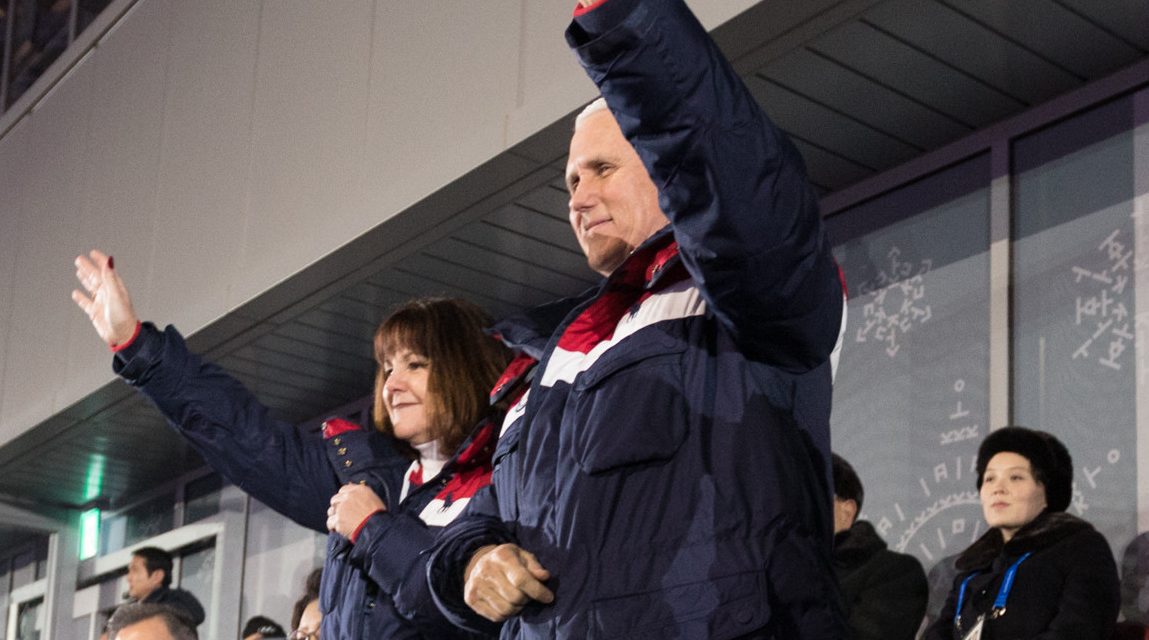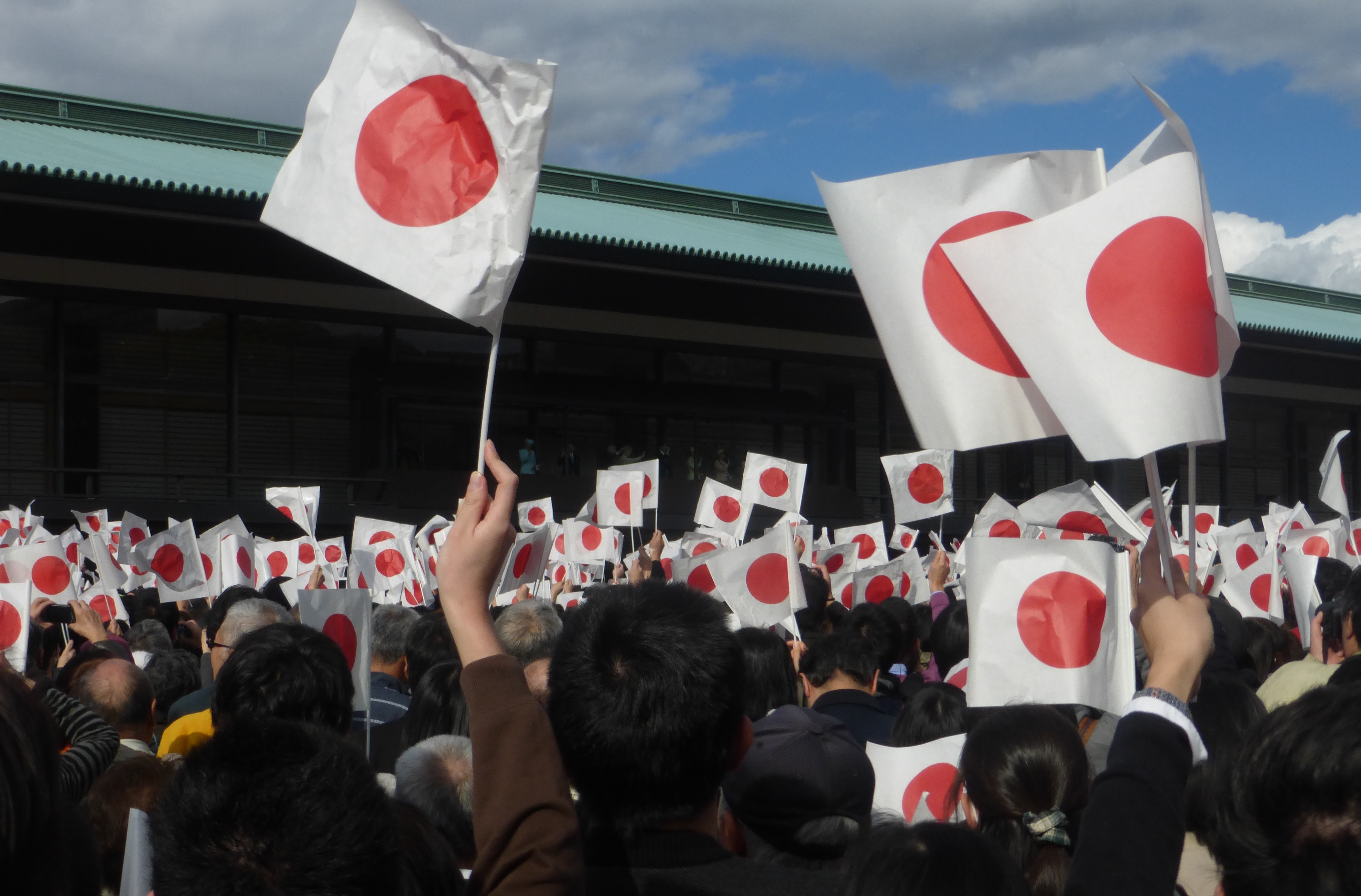By: Tim Bynion*
Every four years, the Olympic Winter Games serves as an opportunity for countries around the world to send their best skiers, skaters, and snowboarders for a chance to claim Olympic glory for their home nations. Like any event that includes delegations from many countries, the Olympics always serve as a commentary on the state of international affairs at the time. This year is no exception, as the 2018 Olympics, held in PyeongChang, South Korea, have invited a great deal of commentary on the state of North Korean-South Korean relations.
These discussions were only heightened by North Korea’s inclusion in the Games and the decision to have both North and South Koreans march in the Opening Ceremony under one unified Korean flag. The real story, however, came with the collection of world leaders that were in attendance. South Korean President Moon Jae-in was obviously present and cheering on the host nation, and U.S. Vice President Mike Pence and Second Lady Karen Pence also made an appearance to support the Americans. Seated only a few seats away from these leaders was Kim Yo-jong, the sister of North Korean Supreme Leader Kim Jong-un. Given the recent scuffles between U.S. President Donald Trump and Kim Jong-un, the fact that leaders from their countries were all gathered in the same place was sure to make headlines.
Some of these headlines, however, left many people scratching their heads, as several news outlets took the opportunity to send praise in Kim Yo-jong’s direction. The controversy began when CNN proclaimed that “Kim Jong Un’s sister is stealing the show at the Winter Olympics.”[1] In this article, the authors refer to Kim as the Ivanka Trump of North Korea, noting that Kim “is not only a powerful member of Kim Jong Un’s kitchen cabinet but also a foil to the perception of North Korea as antiquated and militaristic.”[2] Although the article did dedicate a paragraph to discussing North Korea’s institutionalized oppression of its citizens, many wondered why a major American news outlet would run a headline that speaks so positively of the woman who serves as deputy director of the Propaganda and Agitation Department of the Workers’ Party for one of the world’s most brutal dictatorships.
The fawning headlines did not stop with CNN. The New York Times also published their own take on the events in PyeongChang: “Kim Jong-un’s Sister Turns On the Charm, Taking Pence’s Spotlight.”[3] Also invoking the comparison to Ivanka Trump, the authors of this piece found that “Ms. Kim managed to outflank Mr. Trump’s envoy to the Olympics, Vice President Mike Pence, in the game of diplomatic image-making.”[4] The authors argued that Pence missed an important opportunity by not standing when the unified Korean team entered the stadium, as Kim evidently came to South Korea with a message of reconciliation between North and South, a message that Pence did not seem to support by standing for the unified team. Kim’s message of unification did not apparently include talk of whether or not her family would embrace democracy and human rights for their citizens.
Similar headlines also appeared on a number of other media sites. Reuters proclaimed that “North Korea heads for diplomacy gold medal at Olympics,”[5] and The Washington Post noted that “The ‘Ivanka Trump of North Korea’ captivates people in the South at the Olympics.”[6] All of these articles praised Kim Yo-jong for her apparent grace, poise, and diplomacy in an environment where many people would understandably be hostile towards her. While stories involving the Kim family are certainly noteworthy and extremely relevant to the study of contemporary international affairs, headlines like the ones discussed above are problematic and potentially dangerous for a number of reasons, the most important of which is the brutality of the government that Kim represents. The innumerable human rights abuses committed by the North Korean government have been well-documented. According to a 2017 study conducted by the International Bar Association War Crimes Committee, Kim Jong-un has overseen the carrying out of ten of the eleven crimes against humanity established by the Rome Statute, including murder, extermination, enslavement, torture, and sexual violence.[7] Defectors have even testified that at one prison camp, between 1,500 and 2,000 children were deliberately overworked and starved to death.[8] As both a member of the Kim family and a North Korean government official, Kim Yo-jong is complicit in these crimes. Her appearance at the Olympics and her country’s willingness to march with their neighbors to the south can only be taken as an attempt to distract the world from the horrors North Korea inflicts on its people. Unfortunately, it appears that some members of the media, knowingly or not, have assisted the Kims by glamorizing Kim Yo-jong.
Taking the brutality of the Kim regime into consideration, the comparison of Kim Yo-jong to Ivanka Trump is also particularly odious. Like any public figure, Ivanka Trump is not and should not be immune to criticism, and she is certainly a polarizing figure, though arguably not to the same extent as her father. That being said, it is frankly absurd to make any meaningful comparison between Trump and Kim other than the fact that they are both prominent figures in their respective countries’ governments. This is where the similarities end. Kim is a member of an unelected royal family who presides over a dictatorship that enforces virtually unmatched brutality and political repression. Trump is part of a government that holds free elections and provides for its citizens all of the civil rights and liberties that North Korea expressly denies its people. Again, this is not to say that Ivanka Trump or the Trump administration itself is immune from critique, but in the United States, one is free to criticize government officials without the fear of being sent to a prison camp. The same cannot be said in North Korea, which is why comparisons between North Korean dictators and American political figures are far-fetched and ignorant of the facts.
Finally, and most importantly, articles that attempt to paint the Kim family in a positive light will do nothing to improve the state of North-South Korean relations. In another article from The New York Times, Choe Sang-hun argued the following:
Just a few months ago, North Korea was regarded as nothing but a menace, rattling the region with nuclear and missile tests and staging bloody political purges at home. Almost overnight, with friendly smiles and messages of reconciliation, Ms. Kim managed to help soften her country’s image among South Koreans, at least for the moment.[9]
That moment will almost certainly end when the Olympics do, as there has been no discussion of actual policy changes within North Korea. While many articles, including the aforementioned one, have carefully analyzed the coyness of Kim’s smile and the underlying messages of her clothing choices, there seems to be no indication of whether or not her government will actually cease its human rights abuses within its borders or stop instigating unrest with its neighbors and the rest of the international community. Even if Kim did successfully change her public image in South Korea through a “charm offensive,”[10] this anecdote is ultimately meaningless. Not only is it a subjective opinion, the idea that a positive diplomatic face will somehow lead to Korean reconciliation after the Olympics are over does not seem tenable. The Kim regime will still be able to carry on its usual activities, and there will be no real incentive for structural reform within the North Korean government. Unless North Korea changes its ways, any talk of reconciliation with South Korea will ultimately ring hollow, and unfortunately, articles that emphasize the supposed diplomatic prowess of Kim Yo-jong place the idealistic over the realistic.
While primarily a sporting event, the Olympics also serve as a symbolic illustration into many aspects of international affairs. Of course, this is often due to the optics of having numerous world leaders together under one roof. Such events offer an opportunity for journalists to analyze the current state of world politics and put forward insights on what the future might hold for the international community. This opportunity brings with it a responsibility. The analysis of international relations does not need to include the glamorization of ruthless dictators and notorious human rights abusers, and the comparison of such leaders to American political figures constitutes a substantial logical leap. Simply put, the diplomatic maneuvers of Kim Yo-jong may indeed make for flashy headlines, but they do not indicate a meaningful shift in North Korean policy, both foreign and domestic, once the Olympic cauldron is extinguished. Perhaps if more attention was placed on the atrocities committed under the rule of the Kim regime and less on the personal actions of one of its most prominent members, real and meaningful change in North-South Korean relations could be possible in the future.
[1] Joe Sterling, Sheena McKenzie, & Brian Todd, “Kim Jong Un’s sister is stealing the show at the Winter Olympics,” CNN, February 10, 2018, https://www.cnn.com/2018/02/10/asia/kim-sister-olympics/index.html.
[2] Ibid.
[3] Motoko Rich & Choe Sang-hun, “Kim Jong-un’s Sister Turns On the Charm, Taking Pence’s Spotlight,” The New York Times, February 11, 2018, https://www.nytimes.com/2018/02/11/world/asia/kim-yo-jong-mike-pence-olympics.html.
[4] Ibid.
[5] Soyoung Kim & James Pearson, “North Korea heads for diplomacy gold medal at Olympics: analysts,” Reuters, February 11, 2018, https://www.reuters.com/article/us-olympics-2018-northkorea-diplomacy-an/north-korea-heads-for-diplomacy-gold-medal-at-olympics-analysts-idUSKBN1FV0JV.
[6] Anna Fifield, “The ‘Ivanka Trump of North Korea’ captivates people in the South at the Olympics,” The Washington Post, February 10, 2018, https://www.washingtonpost.com/world/the-ivanka-trump-of-north-korea-captivates-people-in-the-south/2018/02/10/d56119fc-0e65-11e8-baf5-e629fc1cd21e_story.html?utm_term=.7ba24dee920d.
[7] Joseph Hincks, “’Worse Than Nazi Camps.’ New Report Details Gruesome Crimes Against Humanity at North Korean Prisons,” Time, December 12, 2017, http://time.com/5060144/north-korea-political-prisons/.
[8] Ibid.
[9] Choe Sang-hun, “Warm Welcome Home From Olympics for Kim Jong-un’s Sister,” The New York Times, February 12, 2018, https://www.nytimes.com/2018/02/12/world/asia/north-korea-kim-yo-jong.html.
[10] Rich & Choe, “Kim Jong-un’s Sister,” 2018.
*Disclaimer: The content contained in the following material is the sole ownership of the author and does not reflect the views of the Towson University Journal of International Affairs nor Towson University in any respect whatsoever.







